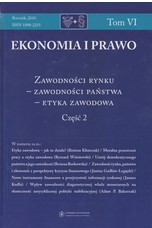Koncepcja „lepsze j regulacji” – założenia i instrumenty realizacji w Unii Europejskiej
Conception of the ”Better regulation” – principles and instruments of realisation in the European Union
Author(s): Tomasz NieborakSubject(s): Economic policy, Political economy, EU-Approach / EU-Accession / EU-Development, Financial Markets, EU-Legislation
Published by: Wydawnictwo Naukowe Uniwersytetu Mikołaja Kopernika
Keywords: Better regulation; European Union; political economy; United Europe;
Summary/Abstract: “Better regulation” occupies a vast rolling terrain in modern political, economic and legal life. For at least 20 years its role and impact have been under intense scrutiny. Also in Europe. The modernisation of the European economy is only one of the elements of a much wider project. Called “United Europe”, it comprises all 27 member states with a total population of 497 million citizens stemming from states of different histories, traditions, languages, and economies. This heterogeneity is the reason for the historic and cultural riches which Europe possesses today, although at the same time it constitutes a major challenge for the European legislator who needs to draft laws for this ‘amalgam of differences’ which the EU presents today. Regulatory process, however, is not free from the old dilemma and question whether, and to what extent, to regulate, particularly, because its regulation may lead to a situation in which the legislator will find himself between Scylla and Charybdis, where the former means overregulation while the latter becomes a symbol of underregulation. This, in turn, will not remain without a negative impact on the functioning and development of the market. Consequently, when drafting new regulations one should attempt to combine several elements such as: coherence, flexibility, transparency and efficiency of the regulatory policy, while regulation itself should be treated as an art of recognising important issues and understanding the functioning of the matter being regulated.
Journal: Ekonomia i Prawo. Economics and Law
- Issue Year: 6/2010
- Issue No: 1
- Page Range: 289-302
- Page Count: 14
- Language: Polish

